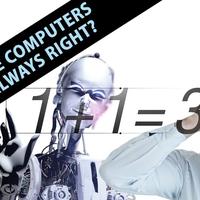Learn to talk about the limitations of technology in 6 minutes! - YouTube
Catherine: Hello and welcome to 6 Minute
English. I'm Catherine.
Rob: And hello, I'm Rob.
Catherine: Today we have another
technology topic.
Rob: Oh good! I love technology. It makes
things easier, it's fast and means I can
have gadgets.
Catherine: Do you think that technology
can actually do things better than humans?
Rob: For some things, yes. I think cars
that drive themselves will be safer than
humans but that will take away some of
the pleasure of driving. So I guess it
depends on what you mean by better.
Catherine: Good point, Rob. And that
actually ties in very closely with today's
topic which is technochauvinism.
Rob: What's that?
Catherine: We'll find out shortly, Rob, but
before we do, today's quiz question.
Artificial Intelligence, or A.I., is an area of
computer science that develops the
ability of computers to learn to do things
like solve problems or drive cars without
crashing. But in what decade was the
term 'Artificial Intelligence'
coined? Was it: a) the 1940s, b) the 1950s
or c) the 1960s?
Rob: I think it's quite a new expression so
I'll go for c) the 1960s.
Catherine: Good luck with that, Rob, and
we'll give you the answer later in the
programme. Now, let's get back to our
topic of technochauvinism.
Rob: I know what a chauvinist is. It's
someone who thinks that their country or
race or sex is better than others. But how
does this relate to technology?
Catherine: We're about to find out.
Meredith Broussard is Professor of
Journalism at New York University and
she's written a book called
Artificial Unintelligence. She appeared on
the BBC Radio 4 programme More or Less
to talk about it. Listen carefully and find
out her definition of technochauvinism.
Meredith Broussard: Technochauvinism is
the idea that technology is always the
highest and best solution. So somehow
over the past couple of decades we got
into the habit of
thinking that doing something with a
computer is always the best and most
objective way to do something and
that's simply not true.
Computers are not objective, they are
proxies for the people who make them.
Catherine: What is Meredith Broussard's
definition of technochauvinism?
Rob: It's this idea that using technology
is better than not using technology.
Catherine: She says that we have this idea
that a computer is objective. Something
that is objective is neutral, it doesn't have
an opinion, it's fair and it's unbiased - so
it's the opposite of being a chauvinist. But
Meredith Broussard says this is not true.
Rob: She argues that computers are not
objective. They are proxies for the people
that make them. You might know the
word proxy when you are using your
computer in one country and want to look
at something that is only available
in a different country. You can use a piece
of software called a proxy to do that.
Catherine: But a proxy is also a person or
a thing that carries out your wishes and
your instructions for you.
So computers are only as smart or as
objective as the people that
programme them. Computers are proxies
for their programmers. Broussard says
that believing too much in Artificial
Intelligence can make the world worse.
Let's hear a bit more. This time find out
what serious problems in society
does she think may be reflected in AI?
Meredith Broussard: It's a nuanced
problem. What we have is data on the
world as it is and we have serious
problems with racism, sexism, classism, ageism, in the world right now so there is
no such thing as perfect data. We also
have a problem inside the tech world
where the creators of algorithms do not
have sufficient awareness of social
issues such that they can make good
technology that gets us closer to a world
as it should be.
Rob: She said that society has problems
with racism, sexism, classism and ageism.
Catherine: And she says it's a nuanced
problem. A nuanced problem is not
simple, but it does have small and
important areas which may be
hard to spot, but they need to be considered.
Rob: And she also talked about
algorithms used to program these
technological systems.
An algorithm is a set of instructions that
computers use to perform their tasks.
Essentially it's the rules that they use
to come up with their answers and
Broussard believes that technology will
reflect the views of those who create the algorithms.
Catherine: Next time you're using a piece
of software or your favourite app, you
might find yourself wondering if it's a
useful tool or does it contain these little
nuances that
reflect the views of the developer.
Rob: Right, Catherine. How about the
answer to this week's question then?
Catherine: I asked in which decade was
the term 'Artificial Intelligence' coined.
Was it the 40s, the 50s or the 60s?
Rob: And I said the 60s.
Catherine: But it was actually the 1950s.
Never mind, Rob. Let's review today's vocabulary.
Rob: Well, we had a chauvinist - that's
someone who believes their country, race
or sex is better than any others.
Catherine: And this gives us
technochauvinism,
the belief that a technological solution is
always a better solution to a problem.
Rob: Next - someone or something that is
objective is neutral, fair and balanced.
Catherine: A proxy is a piece of software
but also someone who does something
for you, on your behalf.
A nuanced problem is a subtle
one, it's not a simple case of right or
wrong, in a nuanced problem there are
small but important things that you need
to consider.
Rob: And an algorithm is a set of software
instructions for a computer system.
Catherine: Well, that's all we have time for
today. Goodbye for now.
Rob: Bye bye!

